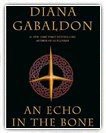Outlander aka Cross Stitch - Gabaldon Diana (читать книгу онлайн бесплатно полностью без регистрации .TXT) 📗
“I think… if I had told him that… he would have killed me.”
Some people have nightmares peopled by monsters. I dreamed of genealogical charts, thin black branches, bearing clusters of dates on every stem. The lines like snakes, with death between the brackets of their jaws. Once again I heard Frank’s voice, saying He became a soldier, a good choice for a second son. There was a third brother who became a curate, but I don’t know much about him… I didn’t know much about him, either. Only his name. There were the three sons listed on that chart; the sons of Joseph and Mary Randall. I had seen it many times: the oldest, William; and the second, Jonathan; and the third, Alexander.
Jamie spoke again, summoning me from my thoughts.
“Sassenach?”
“Yes?”
“Ye know the fortress I told ye of, the one inside me?”
“I remember.”
He smiled without opening his eyes, and reached out a hand for me.
“Well, I’ve a lean-to built, at least. And a roof to keep out the rain.”
I went to bed tired but peaceful, and wondering. Jamie would recover. When that had been in doubt, I had looked no further than the next hour, the next meal, the next administration of medicine. But now I needed to look further.
The abbey was a sanctuary, but only a temporary one. We could not stay here indefinitely, no matter how hospitable the monks. Scotland and England were too dangerous by far; unless Lord Lovat could help – a remote contingency, under the circumstances. Our future must lie on this side of the channel. Knowing what I now knew about Jamie’s seasickness, I understood his reluctance to consider emigration to America – three months of nausea was a daunting prospect to anyone. So what was left?
France was the most likely. We both spoke French fluently. While Jamie could do as well in Spanish, German, or Italian, I was not so linguistically blessed. Also, the Fraser family was rich in connections here; perhaps we could find a place on an estate owned by a relative or friend, and live peacefully in the country. The idea held considerable attractions.
But there remained, as always, the question of time. It was the beginning of 1744 – the New Year was but two weeks past. And in 1745, Bonnie Prince Charlie would take ship from France to Scotland, the Young Pretender come to claim his father’s throne. With him would come disaster; war and slaughter, the crushing of the Highland clans, and with them, the butchery of all that Jamie – and I – held dear.
And between now and then, there lay one year. One year, when things might happen. When steps might be taken to prevent disaster. How, and by what means? I had no idea, but neither had I any doubts about the consequences of inaction.
Could events be changed? Perhaps. My fingers stole to my left hand and idly caressed the gold ring on my fourth finger. I thought of what I had said to Jonathan Randall, burning with rage and horror in the dungeons under Wentworth Prison.
“I curse you,” I had said, “with the hour of your death.” And I had told him when he would die. Had told him the date written on the genealogical chart, in Frank’s fine black calligraphic script – April 16, 1745. Jonathan Randall was to die at the battle of Culloden, caught up in the slaughter that the English would create. But he didn’t. He had died instead a few hours later, trampled beneath the hooves of my revenge.
And he had died a childless bachelor. Or at least I thought so. The chart – that cursed chart! – had given the date of his marriage, sometime in 1744. And the birth of his son, Frank’s five-times-great-grandfather, soon after. If Jack Randall was dead and childless, how would Frank be born? And yet his ring was still upon my hand. He had existed, would exist. I comforted myself with the thought, rubbing the ring in the darkness, as though it contained a jinni that could advise me.
I woke out of a sound sleep sometime later with a half-scream.
“Ssh. ’Tis only me.” The large hand lifted from my mouth. With the candle out, the room was pitch-black. I groped blindly until my hand struck something solid.
“You shouldn’t be out of bed!” I exclaimed, still groggy with sleep. My fingers slid over smooth cold flesh. “You’re freezing!”
“Well, of course I am,” he said, somewhat crossly. “I havena got any clothes on, and it’s perishing in the corridor. Will ye let me in bed?”
I wriggled as far over as I could in the narrow cot, and he slid in naked beside me, clutching me for warmth. His breathing was uneven, and I thought his trembling was from weakness as much as from cold.
“God, you’re warm.” He snuggled closer, sighing. “It feels good to hold ye, Sassenach.”
I didn’t bother asking what he was doing there; that was becoming quite plain. Nor did I ask whether he was sure. I had my own doubts, but would not voice them for fear of making self-fulfilling prophecies. I rolled to face him, mindful of the injured hand.
There was that sudden startling moment of joining, that quick gliding strangeness that at once becomes familiar. Jamie sighed deeply, with satisfaction and, perhaps, relief. We lay still for a moment, as though afraid to disturb our fragile link by moving. Jamie’s good hand caressed me slowly, feeling its way in the dark, fingers spread like a cat’s whiskers, sensitive to vibration. He moved against me, once, as though asking a question, and I answered him in the same language.
We began a delicate game of slow movements, a balancing act between his desire and his weakness, between pain and the growing pleasure of the body. Somewhere in the dark, I thought to myself that I must tell Anselm that there was another way to make time stop, but then thought perhaps not, as it was not a way open to a priest.
I held Jamie steady, with a light hand on his scarred back. He set our rhythm, but let me carry the force of our movement. We were both silent save our breathing, until the end. Feeling him tiring, I grasped him firmly and pulled him to me, rocking my hips to take him deeper, forcing him toward the climax. “Now,” I said softly, “come to me. Now!” He put his forehead hard against mine and yielded himself to me with a quivering sigh.
The Victorians called it “the little death,” and with good reason. He lay so limp and heavy that I would have thought him dead, if not for the slow thump of his heart against my ribs. It seemed a long time before he stirred and mumbled something against my shoulder.
“What did you say?”
He turned his head so his mouth was just below my ear. I felt warm breath on my neck. “I said,” he answered softly, “my hand doesna hurt at all just now.”
The good hand gently explored my face, smoothing away the wetness on my cheeks.
“Were ye afraid for me?” he asked.
“Yes,” I said. “I thought it was too soon.”
He laughed softly in the dark. “It was; I almost killed myself. Aye, I was afraid too. But I woke with my hand painin’ me and couldna go back to sleep. I was tossing about, feeling lonely for ye. The more I thought about ye, the more I wanted ye, and I was halfway down the corridor before I thought to worry about what I was going to do when I got here. And once I thought…” He paused, stroking my cheek. “Well, I’m no verra good, Sassenach, but I’m maybe not a coward, after all.”
I turned my head to meet his kiss. His stomach rumbled loudly.
“Don’t laugh, you,” he grumbled. “It’s your fault, starving me. It’s a wonder I could manage at all, on nothing but beef broth and ale.”
“All right,” I said, still laughing. “You win. You can have an egg for your breakfast tomorrow.”
“Ha,” he said, in tones of deep satisfaction. “I knew ye’d feed me, if I offered ye a suitable inducement.”
We fell asleep face to face, locked in each other’s arms.



